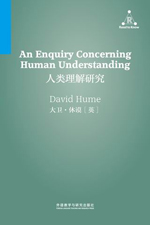人类理解研究
阿豆
Chapter 4: Some doubts about the role of understanding Section 1
All objects of human reason (or research) can be naturally divided into
two kinds, namely, relations of ideas (Relations of Ideas) and actual
things (Matters of F act). Of the first kind are the sciences of
geometry, algebra, and trigonometry; in a word, any assertion which has
the certainty of intuition or the certainty of solution belongs to the
former kind. Propositions of this kind we can find out by the action of
thought alone, and need not be based on anything existing anywhere in
the universe. Even if there is not a circle or a triangle in nature, the
truths that Euclid has solved will always remain true and intelligible.
As for the second object of human reason - actual things - they cannot
be examined in the same way; and no matter how clear we are about their
truth, that clarity is not the same as the previous one. The opposite of
every kind of fact is always possible; for it never contains any
contradiction, and the mind conceives it lightly and clearly, just as
the opposite of that fact fits well into the real situation. All
theories of practical matters seem to be based on the relation of cause
and effect. By virtue of this relationship alone, we can go beyond the
evidence of our memory and senses. I can boldly make the general
proposition, without exception, that the knowledge of this relation does
not, in any instance, arise from a priori inference; it arises solely
because we see, from experience, that certain particular objects are
constantly connected with each other. No matter how strong one's natural
reason and talent may be, he cannot discover any kind of cause or effect
of an entirely new object when he encounters it, even if he has examined
its sensible properties with great precision. We can say
that "cause and effect are discovered not by reason, but by
experience". In short, every result is a different thing
from its cause. Therefore, it cannot be found in its cause; therefore,
the result that one starts with a priori, that one creates, that one
imagines, must be completely arbitrary. Even after this result is
suggested, its connection with the cause is just as arbitrary, for there
are always many other results that appear to reason to be just as fully
self-consistent and natural. Therefore, apart from the help of
observation and experience, we cannot presume to decide anything, or to
infer any cause or effect. When an object or cause is presented
to our mind, it can never suggest the idea of any other object-such as a
result, much less the indissoluble and unbreakable connection between
cause and effect-if we do not infer it and examine it a priori by means
of some observation.



 京公网安备 11010802032529号
京公网安备 11010802032529号